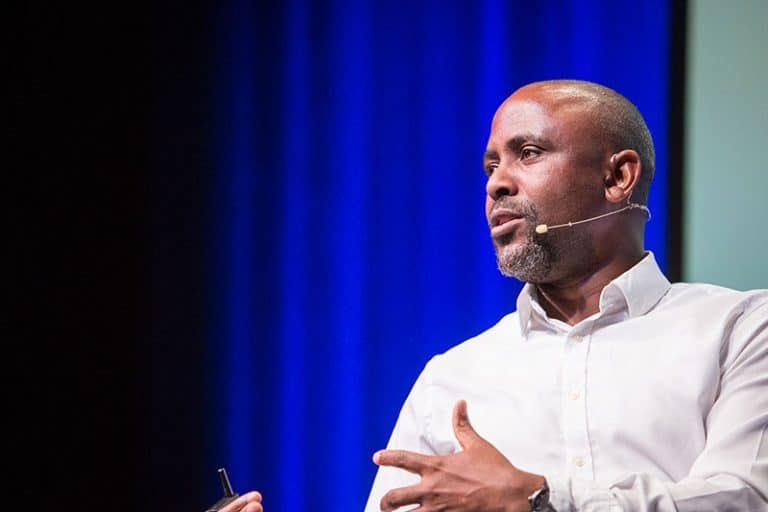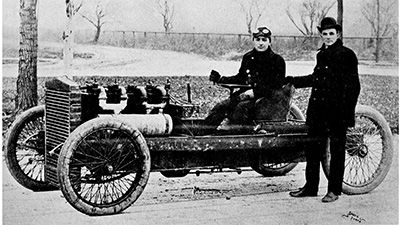

By Stuart Crainer and Des Dearlove
In 1907, Henry Ford professed that his aim was to ‘build a motor car for the great multitude … It will be so low in price that no man making a good salary will be unable to own one – and enjoy with his family the blessing of hours of pleasure in God’s great open spaces … everybody will be able to afford one, and everyone will have one. The horse will have disappeared from our highways, the automobile will be taken for granted’. Ford’s commitment to lowering prices cannot be doubted. Between 1908 and 1916 he reduced prices by 58 percent – at a time when demand was such that he could easily have raised prices. What drove him to do so? The drive to achieve his vision.
‘Posterity will not excuse you if you did not dream big,’ says Narayana Murthy, one of the founders of Infosys. ‘You owe it to your customers, your colleagues, your investors, and society. Every major civilization, every great advance in science and technology, and every great company is built on a big dream’.
Big dreams are not the sole preserve of large organizations. While leading large organizations, whether they be hospitals, companies, even nations, is clearly demanding, leadership is also practiced in much smaller contexts – in families, in teams, in small entrepreneurial startups. Indeed, some of the most inspirational examples come from leaders in such organizations who have big dreams and compelling visions of what they would like to achieve.
Talking to entrepreneurial leaders you never know what to expect. Sometimes their business idea appears hardly developed. Other times it is so highly developed that they can appear to be caught in an entrepreneurial straightjacket of great intentions. Likewise, the personalities and characters of the entrepreneurs vary wildly. Some MBA types seem fixated on spreadsheets and preparing for every known and unknown variable. Others appear more pragmatic, willing to go with the flow.
Pragmatism should not be interpreted as a sign of weakness. This was brought home to us talking with Sarah Wood of Unruly, a marketing company that started life in 2006. There was, she laughingly admitted, no master plan. Indeed, there was no plan.
‘The idea didn’t come first. The idea of Unruly came after we’d founded the company,’ she says. This, we observe, is not the conventional approach. Most companies have an idea of what they want to do but no idea of how to make it a commercial reality. ‘I don’t think there is a right way or a wrong way. Hopefully we’re proof of that’.
Wood joined forces with Scott Button, whom she had known since university, and Matt Cooke. Button and Cooke had worked together at Connextra and used some of their profits from their stakes in Connextra as seed funding for the new business. The trio reckoned they had enough money for eighteen months – ‘A runway big enough to have lots of ideas, but short enough that we needed those ideas to get traction and if they didn’t work we needed to move onto the next one’.
Though Wood describes herself as an ‘accidental entrepreneur’ there is nothing accidental about her or the company’s ambitions. The trio of Unruly founders may not have had a killer idea but they had something that can be even more powerful: bold ambition:
We did have an end game and it was to build a billion-dollar business and we were very clear about that right from the start, and we still are. We want to build a billion-dollar business. That’s still what we’re shooting for and that really helps us make decisions because when we’re looking for new products and we’re making decisions about who we acquire, we say to ourselves, is this helping us get to be a billion-dollar business?
This is not only great entrepreneurial shorthand; it also works for leaders. The best leaders have a killer question they use to test decisions against. What is your shorthand for success?
This is not decorative. A thrilling, exciting purpose is vital to creating a positive culture. It is the job of leaders to create excitement. They are Chief Excitement Officers. This is how Warren Bennis put it:
‘The new leader keeps reminding people of what’s important. Organizations drift into entropy and the bureaucratization of imagination when they forget what’s important. Simple to say, but that one sentence is one of the few pieces of advice I suggest to leaders: Remind your people of what’s important. A powerful enough vision can transform what would otherwise be routine and drudgery into collectively focused energy’.
Leaders provide purpose by describing the big picture, the story of the future and the role of each and every individual in making it reality. They constantly remind people of what really matters.
The undefinable nature of leadership and its relentless focus on the insecure world of change is disquieting, daunting and, perhaps, misses one of the big positive messages of leadership: it should be intent on building something. Leaders are builders – but not of monuments to their own brilliance. They want to achieve a goal, to create something which lasts.
Ask yourself another simple question: what am I building?
One person we have encountered who made the leader-as-builder link is Jimmy Maymann, the Danish CEO of the Huffington Post. ‘I like to build things; companies, houses, sand castles, you name it,’ he says. His building project of the moment is to take the online newspaper global. ‘At this point it is about making a difference, doing something that will change or disrupt something. It’s really not about the money, it’s about that challenge,’ he explains. ‘For me, that is what’s important, that’s what’s getting me up in the morning. The only thing I want to do is build great things, and I would like to be the one that helps HuffPost to become a global media brand’.
Warren Bennis liked to tell the story of the Manhattan Project. ‘The US Army had recruited talented engineers from all over the United States for special duty on the project. They were assigned to work on the primitive computers of the period [1943–45], doing energy calculations and other tedious jobs,’ he told us:
But the Army, obsessed with security, refused to tell them anything specific about the project. They didn’t know that they were building a weapon that could end the war or even what their calculations meant. They were simply expected to do the work, which they did slowly and not very well. Richard Feynman, who supervised the technicians, prevailed on his superiors to tell the recruits what they were doing and why. Permission was granted to lift the veil of secrecy, and Robert Oppenheimer gave them a special lecture on the nature of the project and their own contribution.
The rest is history, but it is only by aiming bold and big that history can begin to be made.
For more information on Sarah Wood and Unruly see ‘Unruly rules’ Business Strategy Review (Winter, 2014),

Thinkers50 Limited
The Studio
Highfield Lane
Wargrave RG10 8PZ
United Kingdom

Thinkers50 Limited
The Studio
Highfield Lane
Wargrave RG10 8PZ
United Kingdom

| Cookie | Duration | Description |
|---|---|---|
| LANG | 9 hours | Linkedin set this cookie to set user's preferred language. |
| nsid | session | This cookie is set by the provider PayPal to enable the PayPal payment service in the website. |
| sp_landing | 1 day | The sp_landing is set by Spotify to implement audio content from Spotify on the website and also registers information on user interaction related to the audio content. |
| sp_t | 1 year | The sp_t cookie is set by Spotify to implement audio content from Spotify on the website and also registers information on user interaction related to the audio content. |
| tsrce | 3 days | PayPal sets this cookie to enable the PayPal payment service in the website. |
| x-pp-s | session | PayPal sets this cookie to process payments on the site. |
| __cf_bm | 30 minutes | This cookie, set by Cloudflare, is used to support Cloudflare Bot Management. |
| Cookie | Duration | Description |
|---|---|---|
| l7_az | 30 minutes | This cookie is necessary for the PayPal login-function on the website. |
| Cookie | Duration | Description |
|---|---|---|
| CONSENT | 2 years | YouTube sets this cookie via embedded youtube-videos and registers anonymous statistical data. |
| _ga | 2 years | The _ga cookie, installed by Google Analytics, calculates visitor, session and campaign data and also keeps track of site usage for the site's analytics report. The cookie stores information anonymously and assigns a randomly generated number to recognize unique visitors. |
| _gat_gtag_UA_10408481_1 | 1 minute | Set by Google to distinguish users. |
| _ga_ZP8HQ8RZXS | 2 years | This cookie is installed by Google Analytics. |
| _gid | 1 day | Installed by Google Analytics, _gid cookie stores information on how visitors use a website, while also creating an analytics report of the website's performance. Some of the data that are collected include the number of visitors, their source, and the pages they visit anonymously. |
| Cookie | Duration | Description |
|---|---|---|
| NID | 6 months | NID cookie, set by Google, is used for advertising purposes; to limit the number of times the user sees an ad, to mute unwanted ads, and to measure the effectiveness of ads. |
| test_cookie | 15 minutes | The test_cookie is set by doubleclick.net and is used to determine if the user's browser supports cookies. |
| VISITOR_INFO1_LIVE | 5 months 27 days | A cookie set by YouTube to measure bandwidth that determines whether the user gets the new or old player interface. |
| YSC | session | YSC cookie is set by Youtube and is used to track the views of embedded videos on Youtube pages. |
| yt-remote-connected-devices | never | YouTube sets this cookie to store the video preferences of the user using embedded YouTube video. |
| yt-remote-device-id | never | YouTube sets this cookie to store the video preferences of the user using embedded YouTube video. |
| yt.innertube::nextId | never | This cookie, set by YouTube, registers a unique ID to store data on what videos from YouTube the user has seen. |
| yt.innertube::requests | never | This cookie, set by YouTube, registers a unique ID to store data on what videos from YouTube the user has seen. |
| Cookie | Duration | Description |
|---|---|---|
| DEVICE_INFO | 5 months 27 days | No description |
| loglevel | never | No description available. |
| m | 2 years | No description available. |
Thinkers50 Limited has updated its Privacy Policy on 28 March 2024 with several amendments and additions to the previous version, to fully incorporate to the text information required by current applicable date protection regulation. Processing of the personal data of Thinkers50’s customers, potential customers and other stakeholders has not been changed essentially, but the texts have been clarified and amended to give more detailed information of the processing activities.